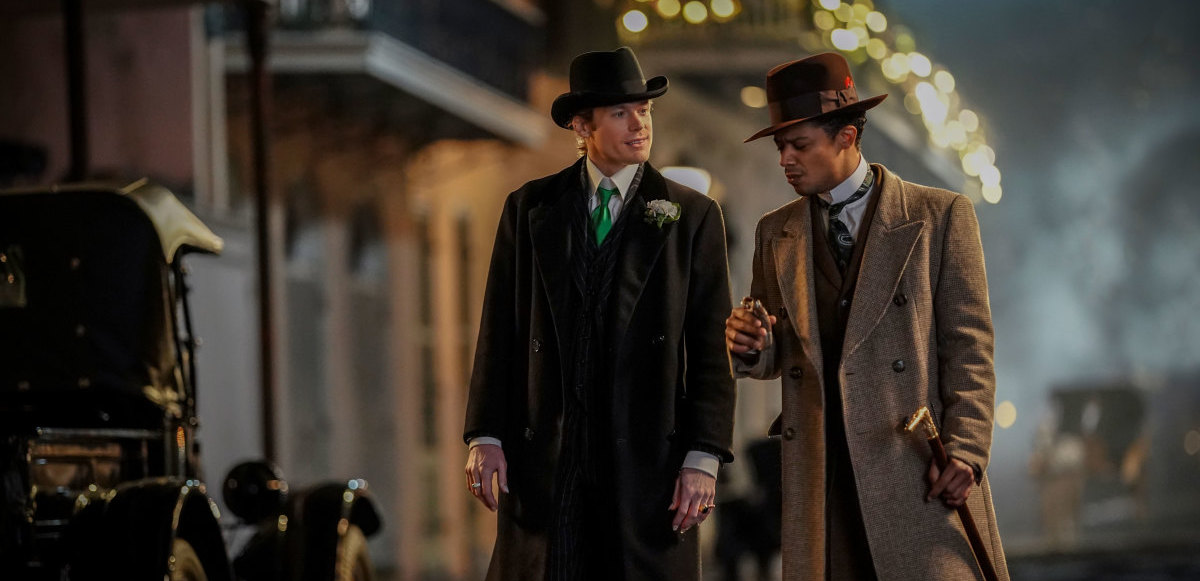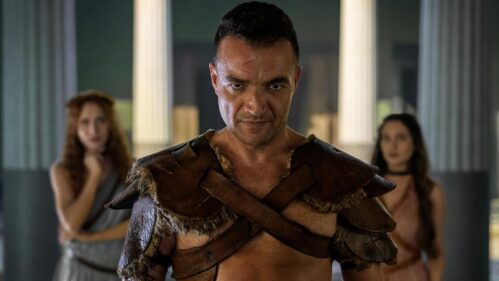Previously tackled by Neil Jordan nearly 30 years ago, Anne Rice’s Interview with the Vampire now receives an episodic treatment from AMC this week (premiering right after more of “The Walking Dead”). Adapted here by Rolin Jones and with the first two episodes directed by Alan Taylor (“Game of Thrones,” “Thor: The Dark World”), the expansive look makes one appreciate how encompassing this overview of a vampire’s life can be: about morality, legacy, and even how one’s fear of death can inhibit one’s enjoyment of the present. These meditations come in a package that includes some cheesy writing and drawn-out storytelling, but that still might have enough positives for this series to leave its mark on the long legacy of Rice’s text.
This “Interview with the Vampire” takes viewers back to 1900s New Orleans’ Storyville neighborhood, also known as the Red-Light district, which is treated with ornate production design and large sets that fill up the screen and suck us in all on their own. And this “Interview” is told through a perspective not often used when going to this point in history. Louis de Pointe du Lac (Jacob Anderson) is a Black business owner who runs underground affairs while also gaining some upward mobility—he can play cards with local white politicians and fat cats, but they also expect a “sir” at the end of his statements. Louis has pride in his community, and a closeness with his family, particularly that of his mighty religious brother Paul (Steven G. Norfleet) who preaches at the dinner table. In a saga that’s all about unlikely bonds, Louis and his brother have a touching relationship that ends with one of the series’ few gripping twists of fate.

“Interview with the Vampire” becomes a love story when Lestat de Lioncourt (Sam Reid) enters the picture, with his staggering, accented low voice and Brad Pitt-esque looks and a self-assured presentation as a classy outsider. Lestat sees Louis for the passion he has inside of him, and not just because Lestat is a hungry vampire who can read and control minds. When the life-changing bite finally happens, it’s a striking moment—in part for its open, blissful sexuality, leading to a hot and heavy relationship between them that makes more transparent what Jordan’s film shrouded (though its performances, arguably, did not). Throughout, Lestat helps embolden him as a person, as a business owner seeking more power, a Black man seeking more visibility in an openly racist society.
Enter Claudia, an immortalized 14-year-old girl (Bailey Bass) who becomes a fascinating linchpin for their domestic tranquility until things start to rot away over time with her angst. Bass’ work as Claudia, which is good enough to parallel that from Dunst in the film, articulates, even more, the claustrophobia of this unquenchable bloodlust and immortality, and she highlights how much of a tragedy it is to stay the same, to not grow old. Worse, it wasn’t much of her choice, and the feeling of a makeshift family can’t replace the isolation she feels from the entire world.
This is all being recounted to a reporter in modern times, keeping with the key framing device that had Christian Slater listening to a wisened Brad Pitt in the Jordan film. In this case, it’s Eric Bogosian’s acerbic and seasoned reporter Daniel Molloy, who first interviewed Louis almost 50 years ago. Now Louis is interested in sharing more of the truth about his life while revealing to Molloy his hard-earned life reflections as they sit across from each other in a Dubai skyscraper.
In a too-gradual build of tension, Molloy doesn’t hesitate to push back against things that his murderous host says, or to ask for more, like about ripped pages from Claudia’s journals (an irate Louis says she does not want her exploited). As their conversation takes place in the Dubai skyscraper, sometimes it provides voice-over to the flashback, which can be too on-the-nose. In one particular eye-rolling moment, Molloy’s off-screen voice chimes in with a real record-scratch moment: “Take a Black man in America, make him a vampire, f**k with that vampire, and see what comes of it.”

Anderson can be a compelling screen presence, especially as he charts the psychological experience of his vampirism from decades and decades ago. He established a certain moral boundary with killing—causing him to feast on fish, rabbits, and other animals instead of human fare. It all comes with larger, fascinating ideas about identity, a frame for his understanding of self as a gay man in such comparably conservative times. Throughout, Louis was someone who wants to stay connected to his family, his community, and “his people,” as he repeats.
But vampire acting can be a tough game of brooding hamminess, which this series even notes when Lestat, Louis, and Claudia go to see a vampire movie and later laugh about the stiff, jagged, leering body, and slow-moving claw of an on-screen vampire. We get a more human-inspired version here of course than that telling, and yet the grave self-seriousness here makes for progressively flat performances in their own right. And while all of the billowing resentment and struggle between our vampires has to go somewhere, it comes out from Louis and Lestat in sometimes overly melodramatic bursts of screaming dialogue. The strings swell behind them, sometimes the sets are destroyed, and both Anderson and Reid get to show all of their teeth as actors. “Interview with the Vampire” jumps on this whenever it can, revealing how the series can only break its growing monotony with either showy dramatic displays or (albeit staggering) moments of gory violence, like a turbo vampire punch that impales someone’s face.
Like a drop of blood from the vampire who initially chewed you out, this episodic adaptation (with seven episodes for season one) offers you a distinct choice. Viewers can get more or less the same events by re-watching Jordan’s film, or they can get a much more elongated presentation of these ideas in a much more drawn-out telling, with a more contemporary acknowledgment of race and sexuality. I choose the Jordan movie for its efficiency, though this version is not without its curiosities and its merits.
Five episodes were provided and screened for review. The first two episodes of “Interview with the Vampire” premiere on AMC on October 2nd.












